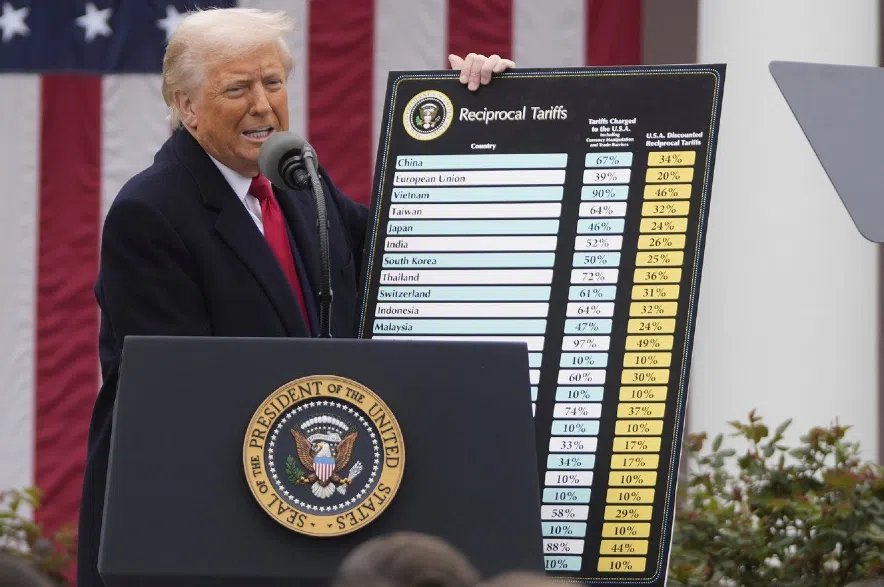Frank McKenna, former Canadian ambassador to the United States and former premier of New Brunswick joined Vassy Kapelos to talk about how Prime Minister Mark Carney can approach his first meeting with U.S. President Donald Trump and what to prioritize amid tariff and annexation threats.
The Vassy Kapelos Show airs on Saturdays and replays on Sundays on 650 CKOM and 980 CJME.
These questions and answers have been edited and condensed for clarity.
Read more:
- Trump, trade barriers and passing a budget on Carney’s spring to-do list
- Manitoba warns of new measles exposure sites south of Winnipeg
Vassy Kapelos: What is this new government up against when it comes to Donald Trump and what are we collectively as Canadians up against in navigating this relationship?
Frank McKenna: It’s a white space. It starts off where there are no bad feelings. Nothing has taken place so it’s a great opportunity.
It’s a wonderful opportunity for us to get our facts out. The president has been lying about the relationship with Canada. There is no $200 billion subsidy of Canada, that’s just wrong.
The United States does need Canada and needs a lot of the things that we produce, so when he’s (Trump) saying that they need nothing from Canada, that’s wrong.
I’d start with almost saying you’re entitled to your opinion, but not entitled to your facts and get a fact sheet that would not only be given to the president but to the cabinet and congress and to the press, outlining the real state of affairs between Canada and the United States.
When you look at the facts, Trump really needs to approach us as an equal and he also has to be knowledgeable about his own polling numbers. He’s just been polled as the most unpopular president in the history of the United States at 100 days — a poll that came out yesterday indicated 86 per cent of Americans are dead opposed to his idea of making Canada the 51st state.
Trump is facing off with a prime minister who just won a resounding mandate from the Canadian public and who probably knows as many world leaders as he does.
So we’re not in a position of weakness in this negotiation, and I think we need to approach it as equals and as a country that has been a reliable partner to the United States now for 100 years.
Kapelos: Should the priority be to get the tariffs removed, or will that be part and parcel of a larger negotiation?
McKenna: It would be a wonderful result if we could achieve it, but I suspect it will be part of a larger negotiation.
This idea that we’re a source of fentanyl is just wrong. The Wall Street Journal said there are 23,000 pounds of fentanyl coming across the Mexican border and a soup-can full across the Canadian border.
We need to dispel those myths and also make it clear to Trump that we’re their biggest trading relationship. You have biggest buyer of all your goods, and yet we’ve got the lowest trade deficit, and that’s only because we send raw materials to the U.S. which you process and create jobs.
You have to make clear that 31 per cent of our tourism goes to the U.S., 80 per cent of our products, 70 per cent of your aluminum, 25 per cent of your oil and critical minerals come from Canada.
You have to make it clear to the president that he needs us and any tariffs you put up, we’re going to retaliate in kind and we’re going to make you pay for it.
I think we need to be there as assertive people, not as supplicants on bended knee but as equals. I also think that we need to make sure that this is not a one-way negotiation. They may have some issues, but we do as well.
We’ve got guns coming across the border that that are responsible for 70 per cent of the murders in Canada, softwood lumber is being blocked at the border, which is now created a $10 billion escrow account, and we lose $60 to $80 billion on oil that we send discounted to the United States.
We really have an extraordinarily strong case with the United States of America, and I think we need to assert it and respect the agreement that we already have, which provides tariff-free access between the U.S., Mexico and Canada.
Kapelos: Considering the public opinion polling for Donald Trump, do you think there is a bit of a vulnerability there?
McKenna: Hugely. He says Canada would be a cherished 51st state but polling in the United States shows there are a number of states there would like to become a 10th or 11th or 12th province of Canada. Alaska’s at 36 per cent and would fit in beautifully with Canada. So we can remind him of that.
I think we’ve got a mutual interest in calming things down and restoring confidence. Part of the problem for Trump is consumer confidence in the U.S. has cratered, as has business confidence. That’s true here in Canada as well.
We can calm markets down, calm individuals down and and talk about how we’re going to get this thing under control, and have a resumption of the relationship of an integrated economy with the three countries that will create more consumer spending and more investment spending.
Both sides have a really strong vested interest in in doing that because that is the root cause of Trump’s really terrible poll numbers.
There’s no support in the United States for what Trump is doing with Canada, so he could help himself a lot by having a respectful relationship with us.
Read more:











